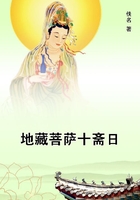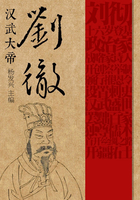DAR'S a pow'ful rassle 'twix de Good en de Bad, En de Bad's got de all-under holt;
En w'en de wuss come, she come i'on-clad, En you hatter hole yo' brof for de jolt.
But des todos de las' Good gits de knee-lock, En dey draps ter de groun'-ker flop!
Good had de inturn, en he stan' like a rock, En he bleodzd for ter be on top.
De dry woddor breaks wid a big thunder-clap, For dey ain't no drout' w'at kin las', But de seasons w'at whoops up de cotton crap, Likewise dey freshens up de grass.
De rain fall so saf' in de long dark night, Twel you hatter hole yo' han' for a sign, But de drizzle w'at sets de tater-slips right Is de makin' or de May-pop vine.
In de mellerest groun' de clay root'll ketch En hole ter de tongue or de plow, En a pine-pole gate at de gyardin-patch Never'll keep out de ole brindle cow.
One en all on us knows who's a pullin' at do bits Like de lead-mule dat g'ides by de rein, En yit, somehow or nudder, de bestest un us gits Mighty sick or de tuggin' at de chain.
Hump yo'se'f ter de load en fergit de distress, En dem w'at stan's by ter scoff, For de harder de pullin', de longer de res', En de bigger de feed in de troff.
A STORY OF THE WAR
WHEN Miss Theodosia Huntingdon, of Burlington, Vermont, concluded to come South in 1870, she was moved by three considerations. In the first place, her brother, John Huntingdon, had become a citizen of Georgia-having astonished his acquaintances by marrying a young lady, the male members of whose family had achieved considerable distinction in the Confederate army; in the second place, she was anxious to explore a region which she almost unconsciously pictured to herself as remote and semi-barbarous; and, in the third place, her friends had persuaded her that to some extent she was an invalid. It was in vain that she argued with herself as to the propriety of undertaking the journey alone and unprotected, and she finally put an end to inward and outward doubts by informing herself and her friends, including John Huntingdon, her brother, who was practicing law in Atlanta, that she had decided to visit the South.
When, therefore, on the 12th of October, 1870-the date is duly recorded in one of Miss Theodosia's letters-she alighted from the cars in Atlanta, in the midst of a great crowd, she fully expected to find her brother waiting to receive her. The bells of several locomotives were ringing, a number of trains were moving in and out, and the porters and baggage-men were screaming and bawling to such an extent that for several moments Miss Huntingdon was considerably confused; so much so that she paused in the hope that her brother would suddenly appear and rescue her from the smoke, and dust, and din. At that moment some one touched her on the arm, and she heard a strong, half-confident, half-apologetic voice exclaim:
"Ain't dish yer Miss Doshy?"
Turning, Miss Theodosia saw at her side a tall, gray-haired negro.
Elaborating the incident afterward to her friends, she was pleased to say that the appearance of the old man was somewhat picturesque. He stood towering above her, his hat in one hand, a carriage-whip in the other, and an expectant smile lighting up his rugged face. She remembered a name her brother had often used in his letters, and, with a woman's tact, she held out her hand, and said:
"Is this Uncle Remus?"
"Law, Miss Doshy! how you know de ole nigger? I know'd you by de faver; but how you know me?" And then, without waiting for a reply: "Miss Sally, she sick in bed, en Mars John, he bleedzd ter go in de country, en dey tuck'n sont me. I know'd you de minnit I laid eyes on you. Time I seed you, I say ter myse'f, 'I lay dar's Miss Doshy,' en, sho nuff, dar you wuz. You ain't gun up yo' checks, is you? Kaze I'll git de trunk sont up by de 'spress waggin."
The next moment Uncle Remus was elbowing his way unceremoniously through the crowd, and in a very short time, seated in the carriage driven by the old man, Miss Huntingdon was whirling through the streets of Atlanta in the direcfion of her brother's home. She took advantage of the opportunity to study the old negro's face closely, her natural curiosity considerably sharpened by a knowledge of the fact that Uncle Remus had played an important part in her brother's history. The result of her observation must have been satisfactory, for presently she laughed, and said:
"Uncle Remus, you haven't told me how you knew me in that great crowd."
The old man chuckled, and gave the horses a gentle rap with the whip.
"Who? Me! I know'd you by de faver. Dat boy er Mars John's is de ve'y spit en immij un you. I'd a know'd you in New 'Leens, let lone down dar in de kyar-shed."
This was Miss Theodosia's introduction to Uncle Remus. One Sunday afternoon, a few weeks after her arrival, the family were assembled in the piazza enjoying the mild weather. Mr. Huntingdon was reading a newspaper; his wife was crooning softly as she rocked the baby to sleep; and the little boy was endeavoring to show his Aunt Dosia the outlines of. Kenesaw Mountain through the purple haze that hung like a wonderfully fashioned curtain in the sky and almost obliterated the horizon. While they were thus engaged, Uncle Remus came around the corner of the house, talking to himself.
"Dey er too lazy ter wuk," he was saying, "en dey specks hones' fokes fer ter stan' up en s'port um. I'm gwine down ter Putmon County whar Mars Jeems is-dat's w'at I'm agwine ter do."
"What's the matter now, Uncle Remus?" inquired Mr. Huntingdon, folding up his newspaper.
"Nuthin' 'tall, Mars John, 'ceppin deze yer sunshine niggers. Dey begs my terbacker, en borrys my tools, en steals my vittles, en hit's done come ter dat pass dat I gotter pack up en go. I'm agwine down ter Putmon, dat's w'at."
Uncle Remus was accustomed to make this threat several times a day, but upon this occasion it seemed to remind Mr. Huntingdon of something.















